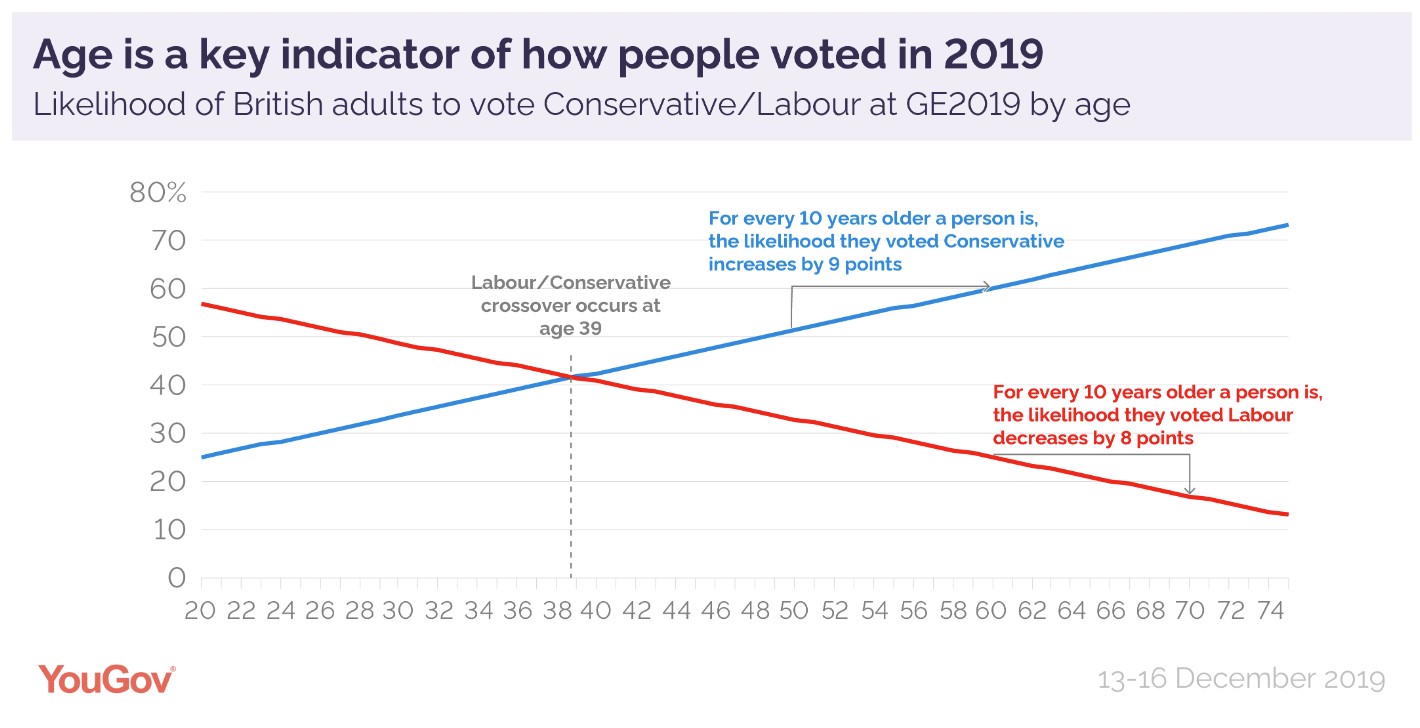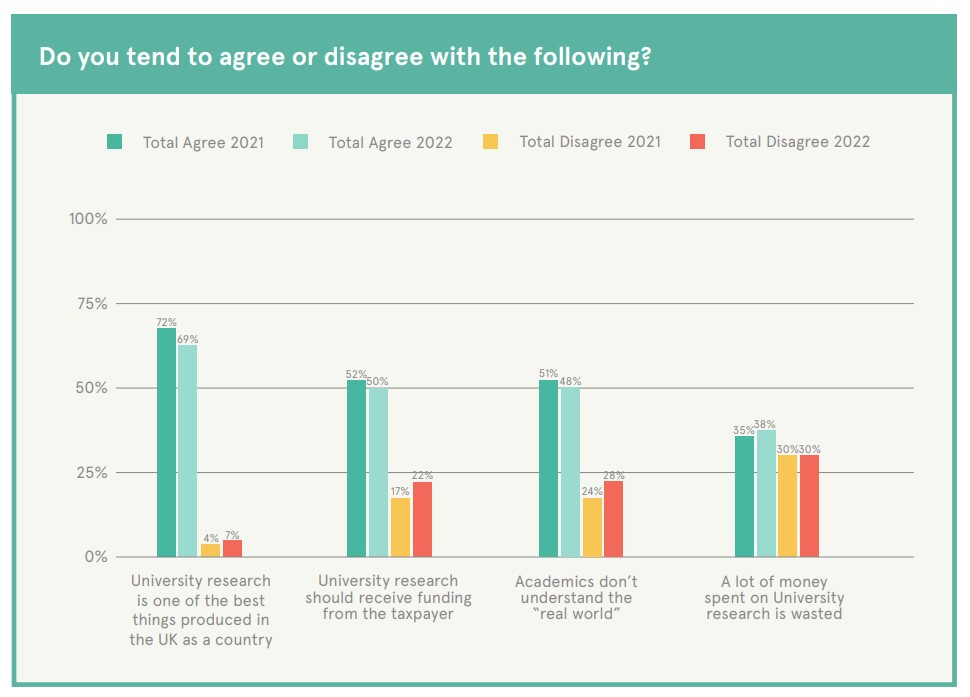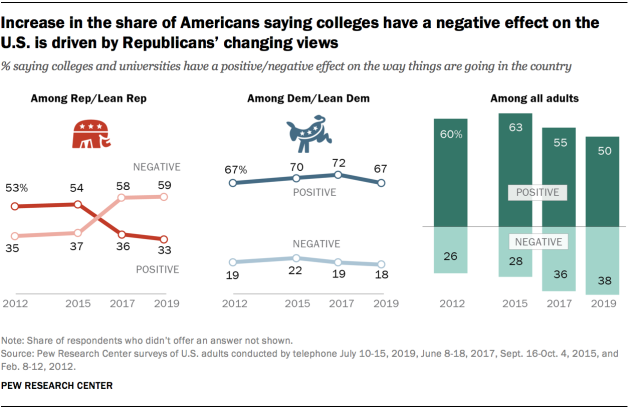Some cheery news at last!
New polling by Public First finds that three quarters of the public think getting a degree is an impressive achievement, even more agree that universities are important to research and innovation, and a clear majority of the public think they are important to the UK economy as a whole.
The sector matters after all!
This second and hopefully now annual UPP Foundation / HEPI commissioned Study of Public Attitudes to Higher Education (in England) was carried out last August – so we might have expected attitudes to have hardened since 2021 as cost of living pressures and economic issues started to force the “tough choices” that politicians like to talk of.
Nevertheless, seven in ten agreed that “university research is one of the best things produced in the UK as a country, half the population still think that university research should receive funding from the taxpayer (no change on last year), and overall people are more likely to say the proportion of the population going to university should stay the same or increase than say it should decrease.
And crucially, support for universities among voters in England continues to run significantly higher than support for the sector among voters in the United States.
So why are neither students nor their universities getting the index-linked increases to funding that they say they need? And is the feeling of being ignored in funding rounds and political debates an inevitable dose of self-interest when others have it worse, or a justified cry for help?
Tipping points
To answer these questions, we do first need to bear in mind that there is a difference between “the public” and “the section of the public that elected the government”.
At the 2019 General Election, it was over 40s that broke for the Conservatives – with YouGov putting the magic tipping point at age 39. There were also moderate divides by gender, a closeish relationship to Brexit attitudes and a weakening relationship with social class.

But as well as age, education was a big divider too. Of those with a degree, 43 per cent voted Labour and just 29 per cent voted Conservative – for those with qualifications at Level 2 or below, 25 per cent voted Labour and 58 per cent voted Conservative.
So in that context, once you dive into the cross breaks in Public First’s polling data, the malaise starts to make more sense.
Take, for example, a simple binary question on the importance of having a university degree.
The weighted English average here is that around a third of the population think it’s important – rising to 40 per cent for under 24s, and down at 24 per cent for over 65s. And there are the splits you’d predict on class, Brexit attitudes and party affiliation.
Most strikingly, the agreement rate is up at 70 per cent when both parents attended university, and is much higher than average once respondents had a degree.
There are similar results for perception of the importance of highest qualification. Only 1 in 5 of those who topped out at Level 2 say that qualification was important – rising to almost 89 in 10 for those with a PGT. Experiencing higher education is, it seems, crucial to building long term support for it.

Welcome to the real world she said to me, optimistically
On one level then, optimists can therefore look at much of the data here and conclude that while the current situation might feel challenging, it’s only challenging in a context of wider national challenges – and in the long term, increases in participation seen in recent decades will feed through into solid public support for the sector and its students.
People will remain ambitious, especially for their kids, and so for all the occasional noises about numbers, ministers of all stripes are very unlikely to impose changes that will make them look like the enemy of opportunity.
But there are warning signs here if you’re inclined (and comfortable enough) to sit back and take that long view.
Among all the age groups, it’s 18 to 24s that are most likely to think the disadvantages of higher education outweigh the advantages – with its cost, its knock-on delay to entering the labour market and its impacts on mental health the top three downsides ticked.
18 to 24s are also most likely to say that university is a waste of time (over 4 in 10 say so), and believing that university fails to prepare students for the “real world” is pretty consistent across the age groups – with “studying topics which do not clearly lead to a profession is a waste of time” also generating double the support than its opposite view across almost all of the characteristics.
On the freedom of speech stuff, while there are results you might expect for believing that it’s “under threat” on campus, when asked if university “teaches everyone to think and act the same and imposes a set of values on everyone”, it’s the young and those who’ve experienced it that are most likely to agree.
And when asked if it matters that your “long term romantic partner” has a similar educational background (ie degree or not), it’s the young that are over twice as likely to say yes than over 55s.
Add in the material about how important it is to get people visiting, interacting with or experiencing higher education, and what emerges isn’t so much an age effect fused with a participation based pyramid scheme – it’s more that the public will support higher education the less elitist, other worldly and more practically impactful it is.
It’s not that the public want to be impressed – it’s that they want it to be grounded in the real world – and nowhere is that more obvious than in the data on student finance.
Earn while you learn
It’s unsurprising that “students” as a group don’t feature in the top three when respondents were asked who should be the priority for additional government support to tackle the rising cost of living.
But it’s telling that “people working in jobs which pay minimum wage” and “families with young children” are separated out as categories – and in some ways disappointing that the polling didn’t (for example) test attitudes to help for students from low-income households.
More helpful are the public’s views on maintenance support – coming out clearly in favour of the amounts being enough to cover rent, university expenses like textbooks, household bills and food.
If the Department for Education (DfE) does ever dare to publish the results of last year’s Student Income and Expenditure Survey, we should be able to both guess what students need, and what proportion of it the public think it should be funded via maintenance rather than part time work or parents.

On that, pretty much everyone thinks that part-time work should be in the mix – it’s the number one answer for all characteristics when given options to solve the loan not being enough – but the public are split on how much part-time work should be undertaken.
1 in 10 say none, 16 per cent say only in the holidays, and there’s very low support for working more than 15 hours a week – with a clear majority believing that students should work modest hours during term-time to help fund their studies.
It all ought to point us towards a more sophisticated definition of student precarity that could be helpful both in local planning and national lobbying – and should remind us that it’s tales of their treatment that will have the most impact on public perception, when compared to glossy PDFs and civic receptions.
It’s also another signal that the public will put up with more higher education (funding) – but only if it’s seen to be useful, locally impactful, and where they perceive a proper partnership between the individual and the state.













